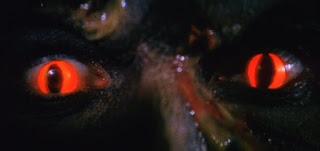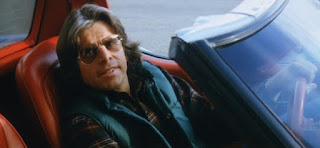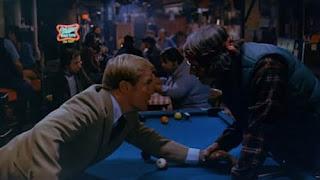
The '70s were a particularly bad time for low budget horror, as filmmakers abandoned the goofy charm of the '50s B cycle for excess gore, grime and general nastiness. John Cardos's The Dark (1979) exemplifies the form, a poorly-made, nearly-plotless exercise in misery that wallows in unpleasantness.
Los Angeles is terrorized by a serial killer called "The Mangler," who lurks in dark alleys and tears people's heads off. Hardbitten Detective Mooney (Richard Jaeckel) has no leads or suspects, while TV news anchor Zoe (Cathy Lee Crosby) delivers sensationalized reports about the "culture of violence" which would allow such things. When one victim's father, famous author Roy Warner (William Devane) gets involved in the case, it turns out he has a grudge against Mooney who'd previously been responsible for locking him up on a murder charge. This band of malcontents argue and bicker while the body count rises, forcing them to seek-out a psychic (Jacquelyn Hide) to track down The Mangler, whom it turns out is more than your ordinary murderer.
Wikipedia informs us that The Dark experienced a rough gestation: originally a Tobe Hooper project, he was fired after clashing with the producers (schlockmeister Edward Montoro and none other than Dick Clark) and replaced by John "Bud" Cardos, a former actor and stuntman whose previous credit was the William Shatner opus Kingdom of the Spiders (1977). Cardos himself ran into difficulties when the studio, chasing the post-Star Wars science fiction boom, made his serial killer into a space alien, which explains why this inhumanly massive, laser-shooting killer wears jeans and a biker jacket. Under these circumstances Orson Welles couldn't have produced a masterpiece, but one can see the bones of a serviceable, if unambitious chiller.
 Well, abandon even that modest hope because The Dark is just 85 to 92 minutes (depending on which cut you watch) of unrelenting drear, disguised as a movie. Cardos and writer Stanford Whitmore set the barest bones of plot in motion and then don't bother to try engaging the audience. The film opens with a gruesome stalking-murder completely bereft of suspense or style: before she can utter a word of dialogue, the victim vanishes into the shadows, immediately marking her for death. She walks through the darkness, brushes past a vaguely menacing vagrant, until a hand pops from the shadows to Mangle her. This sequence sets the tone: random episodes of unmotivated violence against people we don't know, all of it impossible to see.
Well, abandon even that modest hope because The Dark is just 85 to 92 minutes (depending on which cut you watch) of unrelenting drear, disguised as a movie. Cardos and writer Stanford Whitmore set the barest bones of plot in motion and then don't bother to try engaging the audience. The film opens with a gruesome stalking-murder completely bereft of suspense or style: before she can utter a word of dialogue, the victim vanishes into the shadows, immediately marking her for death. She walks through the darkness, brushes past a vaguely menacing vagrant, until a hand pops from the shadows to Mangle her. This sequence sets the tone: random episodes of unmotivated violence against people we don't know, all of it impossible to see.Cardos made Kingdom of the Spiders endearing in its silliness, but The Dark is all dour. Presumably going for atmosphere, he bathes every sequence in smudgy, impenetrable darkness that makes it nearly impossible to follow the basic mechanics of any given scene. Killings are quick, brutal, perfunctory, not even entertaining as a gory guilty pleasure - though viewers may wonder why a creature capable of blowing up victims with laser beams bothers with decapitations. For that matter, The Dark doesn't bother to explain what The Mangler is, where it came from, or why it's indiscriminately killing people; maybe he's the Predator's surly sibling, eager to one-up his little brother?
Clearly, the barest minimum of effort was put into The Dark, next to which even the cheesiest slashers are high-tier craftsmanship. When we aren't watching random Los Angelenos lose their noggins, we're subjected to endless banalities cadged from a million other thrillers. To pad the run time we get subplots about journalistic ethics, a milquetoast actor marked for death, would-be vigilantes and scared citizens protesting the cops, all cliches reduced to their barest, crudest essentials. Roger Kellaway contributes a bargain basement score full of discordant marimbas and eerie whispers, like something Dario Argento might have composed in kindergarten.
 The cast can't do much to enliven this mess, though Keenan Wynn provides light comic relief and Casey Kasem (!) appears briefly as a pathologist. Richard Jaeckel enacts cliches from Dragnet reruns while William Devane (dressed like an over-the-hill biker) and Cathy Lee Crosby bicker and pout. The one marginally effective character is Jacquelyn Hide's psychic, but her connection with the Mangler is ill-defined at best, and plays as an extended tangent. But then, that's typical of The Dark's nonsensical, who-cares approach to storytelling. Why bother to explain what's going on, when the Mangler can blow up someone's mirror with his laser eyes?
The cast can't do much to enliven this mess, though Keenan Wynn provides light comic relief and Casey Kasem (!) appears briefly as a pathologist. Richard Jaeckel enacts cliches from Dragnet reruns while William Devane (dressed like an over-the-hill biker) and Cathy Lee Crosby bicker and pout. The one marginally effective character is Jacquelyn Hide's psychic, but her connection with the Mangler is ill-defined at best, and plays as an extended tangent. But then, that's typical of The Dark's nonsensical, who-cares approach to storytelling. Why bother to explain what's going on, when the Mangler can blow up someone's mirror with his laser eyes?After 80 minutes of this nonsense, The Dark finally spins towards its wacko conclusion. After another non-suspenseful chase scene, The Mangler is cornered by an army of LA's finest, who spend five good minutes pumping him full of bullets to no effect. They're no match for his laser beams, and there's some amusement to be had at the terrible special effects as cops explode, burst into flames and topple into bricks. Finally, William Devane puts an end to this nonsense by grabbing some handy debris and setting The Mangler on fire.
Which begs the question: If it were that easy to vanquish this invincible alien, then why subject us to 90-odd minutes of nonsense in the first place? That wouldn't have occurred to the creators of The Dark, who never found a horror movie cliche that they couldn't appropriate, cheapen and, well, mangle. The movie ends with an incoherent, portentous narration about the Unknown, and a reprise of Kellaway's Whisper Score hissing "THE DARKNEEEEESSSSSSS" as we fade to black, annoyed as ever.

